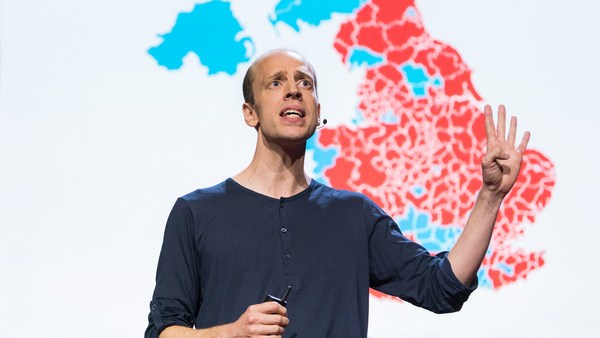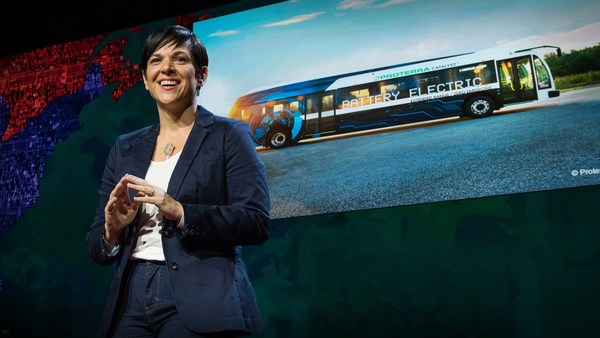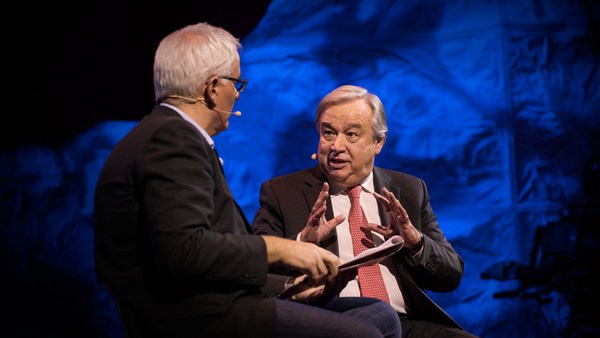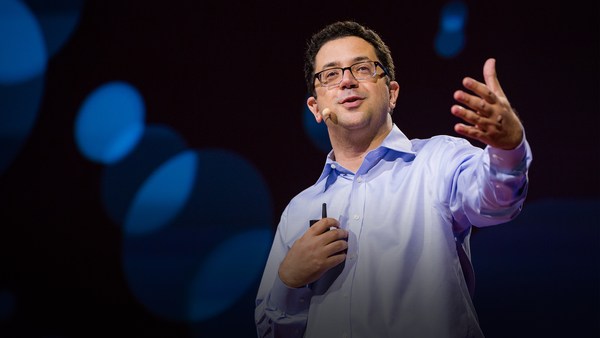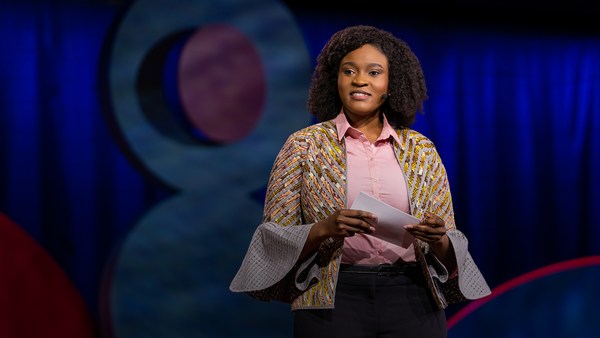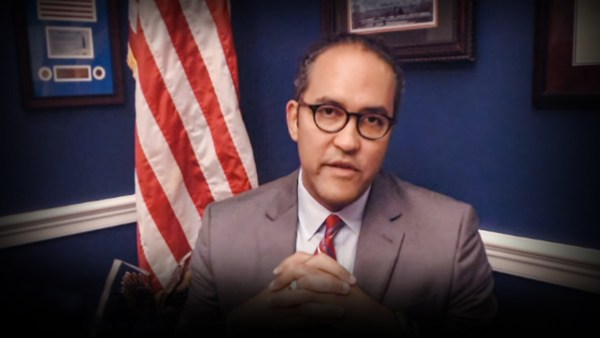The conventional wisdom about our world today is that this is a time of terrible decline. And that's not surprising, given the bad news all around us, from ISIS to inequality, political dysfunction, climate change, Brexit, and on and on. But here's the thing, and this may sound a little weird. I actually don't buy this gloomy narrative, and I don't think you should either. Look, it's not that I don't see the problems. I read the same headlines that you do. What I dispute is the conclusion that so many people draw from them, namely that we're all screwed because the problems are unsolvable and our governments are useless.
Now, why do I say this? It's not like I'm particularly optimistic by nature. But something about the media's constant doom-mongering with its fixation on problems and not on answers has always really bugged me.
So a few years ago I decided, well, I'm a journalist, I should see if I can do any better by going around the world and actually asking folks if and how they've tackled their big economic and political challenges. And what I found astonished me. It turns out that there are remarkable signs of progress out there, often in the most unexpected places, and they've convinced me that our great global challenges may not be so unsolvable after all. Not only are there theoretical fixes; those fixes have been tried. They've worked. And they offer hope for the rest of us.
I'm going to show you what I mean by telling you about how three of the countries I visited -- Canada, Indonesia and Mexico -- overcame three supposedly impossible problems. Their stories matter because they contain tools the rest of us can use, and not just for those particular problems, but for many others, too.
When most people think about my homeland, Canada, today, if they think about Canada at all, they think cold, they think boring, they think polite. They think we say "sorry" too much in our funny accents. And that's all true.
(Laughter)
Sorry.
(Laughter)
But Canada's also important because of its triumph over a problem currently tearing many other countries apart: immigration. Consider, Canada today is among the world's most welcoming nations, even compared to other immigration-friendly countries. Its per capita immigration rate is four times higher than France's, and its percentage of foreign-born residents is double that of Sweden. Meanwhile, Canada admitted 10 times more Syrian refugees in the last year than did the United States.
(Applause)
And now Canada is taking even more. And yet, if you ask Canadians what makes them proudest of their country, they rank "multiculturalism," a dirty word in most places, second, ahead of hockey. Hockey.
(Laughter)
In other words, at a time when other countries are now frantically building new barriers to keep foreigners out, Canadians want even more of them in.
Now, here's the really interesting part. Canada wasn't always like this. Until the mid-1960s, Canada followed an explicitly racist immigration policy. They called it "White Canada," and as you can see, they were not just talking about the snow.
So how did that Canada become today's Canada? Well, despite what my mom in Ontario will tell you, the answer had nothing to do with virtue. Canadians are not inherently better than anyone else. The real explanation involves the man who became Canada's leader in 1968, Pierre Trudeau, who is also the father of the current prime minister.
(Applause)
The thing to know about that first Trudeau is that he was very different from Canada's previous leaders. He was a French speaker in a country long-dominated by its English elite. He was an intellectual. He was even kind of groovy. I mean, seriously, the guy did yoga. He hung out with the Beatles.
(Laughter)
And like all hipsters, he could be infuriating at times. But he nevertheless pulled off one of the most progressive transformations any country has ever seen. His formula, I've learned, involved two parts. First, Canada threw out its old race-based immigration rules, and it replaced them with new color-blind ones that emphasized education, experience and language skills instead. And what that did was greatly increase the odds that newcomers would contribute to the economy. Then part two, Trudeau created the world's first policy of official multiculturalism to promote integration and the idea that diversity was the key to Canada's identity.
Now, in the years that followed, Ottawa kept pushing this message, but at the same time, ordinary Canadians soon started to see the economic, the material benefits of multiculturalism all around them. And these two influences soon combined to create the passionately open-minded Canada of today.
Let's now turn to another country and an even tougher problem, Islamic extremism. In 1998, the people of Indonesia took to the streets and overthrew their longtime dictator, Suharto. It was an amazing moment, but it was also a scary one. With 250 million people, Indonesia is the largest Muslim-majority country on Earth. It's also hot, huge and unruly, made up of 17,000 islands, where people speak close to a thousand languages. Now, Suharto had been a dictator, and a nasty one. But he'd also been a pretty effective tyrant, and he'd always been careful to keep religion out of politics. So experts feared that without him keeping a lid on things, the country would explode, or religious extremists would take over and turn Indonesia into a tropical version of Iran. And that's just what seemed to happen at first. In the country's first free elections, in 1999, Islamist parties scored 36 percent of the vote, and the islands burned as riots and terror attacks killed thousands.
Since then, however, Indonesia has taken a surprising turn. While ordinary folks have grown more pious on a personal level -- I saw a lot more headscarves on a recent visit than I would have a decade ago -- the country's politics have moved in the opposite direction. Indonesia is now a pretty decent democracy. And yet, its Islamist parties have steadily lost support, from a high of about 38 percent in 2004 down to 25 percent in 2014. As for terrorism, it's now extremely rare. And while a few Indonesians have recently joined ISIS, their number is tiny, far fewer in per capita terms than the number of Belgians. Try to think of one other Muslim-majority country that can say all those same things.
In 2014, I went to Indonesia to ask its current president, a soft-spoken technocrat named Joko Widodo, "Why is Indonesia thriving when so many other Muslim states are dying?"
"Well, what we realized," he told me, "is that to deal with extremism, we needed to deal with inequality first."
See, Indonesia's religious parties, like similar parties elsewhere, had tended to focus on things like reducing poverty and cutting corruption. So that's what Joko and his predecessors did too, thereby stealing the Islamists' thunder. They also cracked down hard on terrorism, but Indonesia's democrats have learned a key lesson from the dark years of dictatorship, namely that repression only creates more extremism. So they waged their war with extraordinary delicacy. They used the police instead of the army. They only detained suspects if they had enough evidence. They held public trials. They even sent liberal imams into the jails to persuade the jihadists that terror is un-Islamic. And all of this paid off in spectacular fashion, creating the kind of country that was unimaginable 20 years ago.
So at this point, my optimism should, I hope, be starting to make a bit more sense. Neither immigration nor Islamic extremism are impossible to deal with. Join me now on one last trip, this time to Mexico. Now, of our three stories, this one probably surprised me the most, since as you all know, the country is still struggling with so many problems. And yet, a few years ago, Mexico did something that many other countries from France to India to the United States can still only dream of. It shattered the political paralysis that had gripped it for years.
To understand how, we need to rewind to the year 2000, when Mexico finally became a democracy. Rather than use their new freedoms to fight for reform, Mexico's politicians used them to fight one another. Congress deadlocked, and the country's problems -- drugs, poverty, crime, corruption -- spun out of control. Things got so bad that in 2008, the Pentagon warned that Mexico risked collapse.
Then in 2012, this guy named Enrique Peña Nieto somehow got himself elected president. Now, this Peña hardly inspired much confidence at first. Sure, he was handsome, but he came from Mexico's corrupt old ruling party, the PRI, and he was a notorious womanizer. In fact, he seemed like such a pretty boy lightweight that women called him "bombón," sweetie, at campaign rallies. And yet this same bombón soon surprised everyone by hammering out a truce between the country's three warring political parties. And over the next 18 months, they together passed an incredibly comprehensive set of reforms. They busted open Mexico's smothering monopolies. They liberalized its rusting energy sector. They restructured its failing schools, and much more. To appreciate the scale of this accomplishment, try to imagine the US Congress passing immigration reform, campaign finance reform and banking reform. Now, try to imagine Congress doing it all at the same time. That's what Mexico did.
Not long ago, I met with Peña and asked how he managed it all. The President flashed me his famous twinkly smile --
(Laughter)
and told me that the short answer was "compromiso," compromise. Of course, I pushed him for details, and the long answer that came out was essentially "compromise, compromise and more compromise." See, Peña knew that he needed to build trust early, so he started talking to the opposition just days after his election. To ward off pressure from special interests, he kept their meetings small and secret, and many of the participants later told me that it was this intimacy, plus a lot of shared tequila, that helped build confidence. So did the fact that all decisions had to be unanimous, and that Peña even agreed to pass some of the other party's priorities before his own. As Santiago Creel, an opposition senator, put it to me, "Look, I'm not saying that I'm special or that anyone is special, but that group, that was special." The proof? When Peña was sworn in, the pact held, and Mexico moved forward for the first time in years. Bueno.
So now we've seen how these three countries overcame three of their great challenges. And that's very nice for them, right? But what good does it do the rest of us?
Well, in the course of studying these and a bunch of other success stories, like the way Rwanda pulled itself back together after civil war or Brazil has reduced inequality, or South Korea has kept its economy growing faster and for longer than any other country on Earth, I've noticed a few common threads.
Now, before describing them, I need to add a caveat. I realize, of course, that all countries are unique. So you can't simply take what worked in one, port it to another and expect it to work there too. Nor do specific solutions work forever. You've got to adapt them as circumstances change.
That said, by stripping these stories to their essence, you absolutely can distill a few common tools for problem-solving that will work in other countries and in boardrooms and in all sorts of other contexts, too.
Number one, embrace the extreme. In all the stories we've just looked at, salvation came at a moment of existential peril. And that was no coincidence. Take Canada: when Trudeau took office, he faced two looming dangers. First, though his vast, underpopulated country badly needed more bodies, its preferred source for white workers, Europe, had just stopped exporting them as it finally recovered from World War II. The other problem was that Canada's long cold war between its French and its English communities had just become a hot one. Quebec was threatening to secede, and Canadians were actually killing other Canadians over politics. Now, countries face crises all the time. Right? That's nothing special. But Trudeau's genius was to realize that Canada's crisis had swept away all the hurdles that usually block reform. Canada had to open up. It had no choice. And it had to rethink its identity. Again, it had no choice. And that gave Trudeau a once-in-a-generation opportunity to break the old rules and write new ones. And like all our other heroes, he was smart enough to seize it.
Number two, there's power in promiscuous thinking. Another striking similarity among good problem-solvers is that they're all pragmatists. They'll steal the best answers from wherever they find them, and they don't let details like party or ideology or sentimentality get in their way. As I mentioned earlier, Indonesia's democrats were clever enough to steal many of the Islamists' best campaign promises for themselves. They even invited some of the radicals into their governing coalition. Now, that horrified a lot of secular Indonesians. But by forcing the radicals to actually help govern, it quickly exposed the fact that they weren't any good at the job, and it got them mixed up in all of the grubby compromises and petty humiliations that are part of everyday politics. And that hurt their image so badly that they've never recovered.
Number three, please all of the people some of the time. I know I just mentioned how crises can grant leaders extraordinary freedoms. And that's true, but problem-solving often requires more than just boldness. It takes showing restraint, too, just when that's the last thing you want to do. Take Trudeau: when he took office, he could easily have put his core constituency, that is Canada's French community, first. He could have pleased some of the people all of the time. And Peña could have used his power to keep attacking the opposition, as was traditional in Mexico. Yet he chose to embrace his enemies instead, while forcing his own party to compromise. And Trudeau pushed everyone to stop thinking in tribal terms and to see multiculturalism, not language and not skin color, as what made them quintessentially Canadian. Nobody got everything they wanted, but everyone got just enough that the bargains held.
So at this point you may be thinking, "OK, Tepperman, if the fixes really are out there like you keep insisting, then why aren't more countries already using them?" It's not like they require special powers to pull off. I mean, none of the leaders we've just looked at were superheroes. They didn't accomplish anything on their own, and they all had plenty of flaws. Take Indonesia's first democratic president, Abdurrahman Wahid. This man was so powerfully uncharismatic that he once fell asleep in the middle of his own speech.
(Laughter)
True story.
So what this tells us is that the real obstacle is not ability, and it's not circumstances. It's something much simpler. Making big changes involves taking big risks, and taking big risks is scary. Overcoming that fear requires guts, and as you all know, gutsy politicians are painfully rare. But that doesn't mean we voters can't demand courage from our political leaders. I mean, that's why we put them in office in the first place. And given the state of the world today, there's really no other option.
The answers are out there, but now it's up to us to elect more women and men brave enough to find them, to steal them and to make them work.
Thank you.
(Applause)
